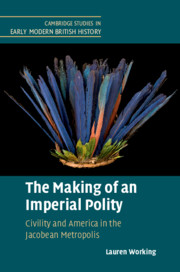Book contents
- The Making of an Imperial Polity
- Cambridge Studies in Early Modern British History
- The Making of an Imperial Polity
- Copyright page
- Dedication
- Contents
- Figures
- Acknowledgements
- Note on Conventions
- Introduction
- Chapter 1 Cultivation and the American Project
- Chapter 2 Colony as Microcosm
- Chapter 3 Cannibalism and the Politics of Bloodshed
- Chapter 4 Tobacco, Consumption, and Imperial Intent
- Chapter 5 Wit, Sociability, and Empire
- Conclusion
- Bibliography
- Index
- References
Bibliography
Published online by Cambridge University Press: 11 January 2020
- The Making of an Imperial Polity
- Cambridge Studies in Early Modern British History
- The Making of an Imperial Polity
- Copyright page
- Dedication
- Contents
- Figures
- Acknowledgements
- Note on Conventions
- Introduction
- Chapter 1 Cultivation and the American Project
- Chapter 2 Colony as Microcosm
- Chapter 3 Cannibalism and the Politics of Bloodshed
- Chapter 4 Tobacco, Consumption, and Imperial Intent
- Chapter 5 Wit, Sociability, and Empire
- Conclusion
- Bibliography
- Index
- References
- Type
- Chapter
- Information
- The Making of an Imperial PolityCivility and America in the Jacobean Metropolis, pp. 216 - 243Publisher: Cambridge University PressPrint publication year: 2020
- Creative Commons
- This content is Open Access and distributed under the terms of the Creative Commons Attribution licence CC-BY-NC-ND 4.0 https://creativecommons.org/cclicenses/

